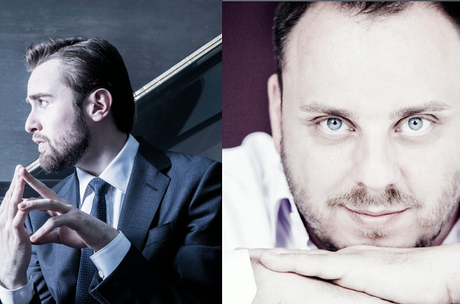by Paul J. Pelkonen

Daniil Trifonov and Matthias Goerne brought their lieder collaboration
to Carnegie Hall on Wednesday night. Photos © the artists websites, assembly by the author.
Their collaboration is part of Mr. Trifonov's current Perspectives series; Carnegie-speak for its artist-in-residency program. It was a 90-minute concert with no intermission and almost no pauses between songs, save for one moment when Mr. Goerne refreshed himself with a glass of water. Carefully curated, this program built an arc that started with Four Early Songs by Berg, followed by all of Robert Schumann's Dichterliebe and short albums of late songs by Hugo Wolf, Dmitri Shostakovich and Johannes Brahms.
If all this sounds a bit hodge-podge, it was quite the opposite. The songs were selected for their dramatic message. First, Berg explored the world of dreams and dreaming, in these four Op. 2 songs that start in the last flowering of 19th century Romanticism and end with the composer's first dip into the dark, swirling waters of atonality. Mr. Goerne, an international opera star who is acclaimed for his portrayal of the composer's hero Wozzeck, took the lead here, his instrument showing a vast range of colors and tones. Mr. Trifonov offered minimal accompaniment here, allowing the voice to flourish.
After the atonal spikes of "Warm die Lüfte," the sudden shift into Dichterliebe was an absolute shock. These sixteen songs (the title means "A Poet's Love") were cherry-picked by Schumann from a large volume of poems by Heinrich Heine. The songs track the course of an infatuation, a love affair and the final total collapse of same with lashings of madness and delusion for the unfortunate protagonist. Schumann's accompaniment for these tales of woe is florid and illustrative. The piano part played with vigor and rigor by Mr. Trifonov.
Mr. Goerne dove headlong into the challenge, using his voice to paint bright colors and occasional ornamentation in the first set of songs. From the loping optimism of "Im wunderschönen Monat Mai" to the great portrait of the Rhine River in "Im Rhein, im heiligen Strome", the bass showed the flexibility and power of his art. Mr. Trifonov's hands blurred in the prancing polka of "Das ist ein Flöten und Geigen", the first hint of despair in the cycle. The later songs touched the same aether as the Berg lieder, with "Ich hab' im Traum geweinet" and "Allnächtlich im Traume" providing a final glimmer before the false dawn of the final two songs.
It is easy to draw an historic, if ugly parallel between Hugo Wolf and Schumann: both men died in an asylum, their minds destroyed by syphilis. And yet their musical worlds are very different. The "Michelangelo-Lieder" are Wolf's three final utterances, settings of poems by the Italian artist. Each is like a compressed Wagner opera, flowing forth in a flood of chromatic writing. Mr. Goerne and Mr. Trifonov brought these images of self-doubt, death, and finally love to vivid life, painting with colors of tone and voice. The final notes of "Fühlt meine Seele das ersehnte Licht" in which Wolf evokes the love of his life, provided a powerful, final comment.
The three numbers chosen from Shostakovich's Op. 145 are also based on Michelangelo, here translated into Russian. Mr. Goerne overcame any linguistic issues with his potent performance of "Dante," "Death" and "Night," bleak songs that criticize the Soviet state through the guise of commentary on the art of the Renaissance. The last selections were the Four Serious Songs of Brahms, written as his last published works in the final year of his life. Based on verses from the Bible and the Apocrypha, each of these was given a powerful, reverential treatment by the two artists. The long, steep and stony path had been climbed at last, and the view was indeed beautiful.

